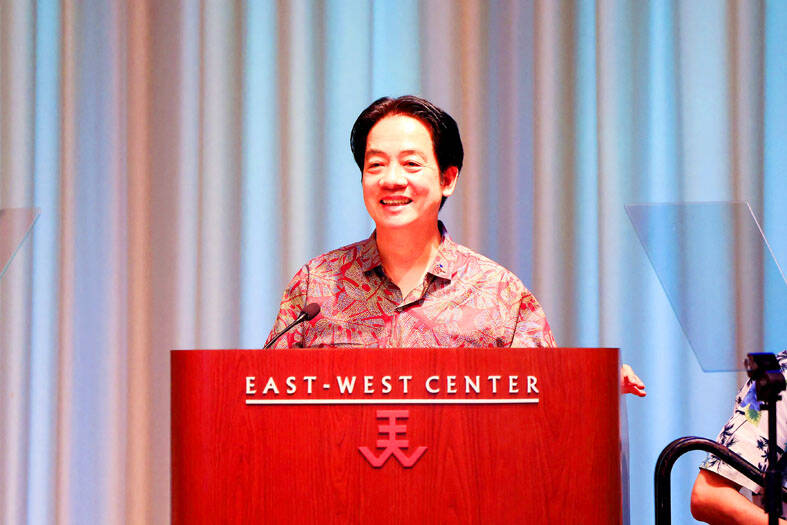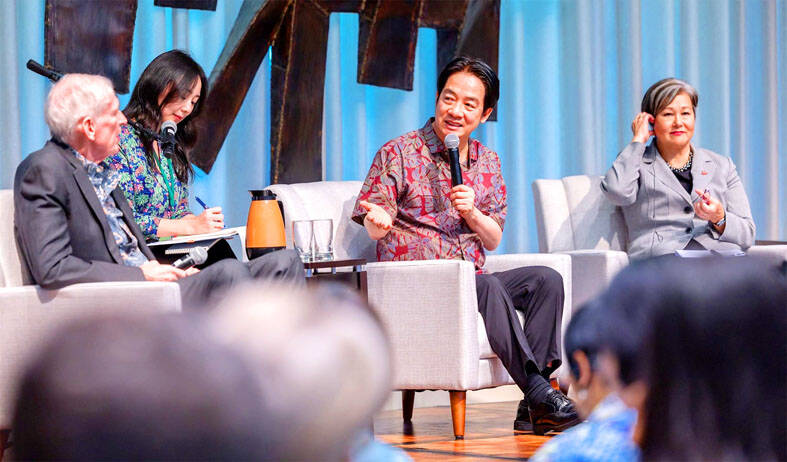Taiwan will take three proactive actions in the Indo-Pacific region and globally to achieve peace and prosperity through defense and economic strength, President William Lai (賴清德) told a forum during his stopover in Hawaii on Sunday.
Lai visited the East-West Center (EWC) in Honolulu for the closed-door forum, which was attended by about 100 guests and hosted by EWC president Suzanne Vares-Lum, with former American Institute in Taiwan chairman James Moriarty and former EWC president Richard Vuylsteke joining Lai in the discussion.
“The EWC is delighted to host Lai this afternoon and to hear his thoughts on Taiwan’s commitment to regional peace and security, and economic collaboration with the US,” the EWC cited Vares-Lum as saying ahead of the forum.

Photo: Reuters
Lai gave an eight-minute address titled “A Future of Mutual Prosperity: Taiwan as a Partner for Peace and Prosperity in the Indo-Pacific Region,” and exchanged gifts with Vares-Lum.
Presidential Office spokeswoman Karen Kuo (郭雅慧) after the forum cited Lai as saying at the forum that Taiwan would take three proactive actions for the Indo-Pacific region and the broader world.
First, Taiwan would actively implement a “four pillars of peace” action plan, which includes buttressing self-defense capabilities, enhancing economic security, deepening democratic partnerships, and facilitating cross-strait dialogues and exchanges.

Photo: AFP / Presidential Office
Taiwan has established the Whole-of-society Defense Resilience Committee as part of the Presidential Office and enhanced cooperation with the US, demonstrating its commitment to national defense, as well as Taiwan and the US’ joint commitment to Indo-Pacific peace, Kuo cited Lai as saying.
The second action is for Taiwan to actively contribute to global supply chains, especially in high-tech industries such as semiconductors.
The Taiwan-US partnership not only facilitated Taiwan’s contribution, but manifested the strategic significance of Taiwan as a reliable partner, Lai was cited as saying, adding that Taiwan also collaborated with other like-minded nations to aid global development with its knowledge and expertise.
Finally, Taiwan is devoted to ensuring peace, stability and prosperity in the Taiwan Strait and the Indo-Pacific region, and it continues to cement friendly relations with Pacific allies through transparent collaborations and fulfillment of commitments in the fields of public health, fisheries, animal husbandry and climate transition, with the goal of achieving smart sustainability, and democratic and diplomatic sustainability, Kuo cited Lai as saying in his address.
Taiwan would also strengthen its self-defense capabilities and cooperate closely with like-minded nations in line with the common cause of “peace through strength,” jointly defending the universal values of freedom, democracy and rule of law, the president was cited as saying.
Kuo also quoted Lai as saying in a question-and-answer session that although Taiwan’s biggest challenge is threats from China, Taiwanese have learned to deal with Chinese threats in an organized, stable manner.
As president, Lai believes his missions are to sustain the nation’s existence and development, buttress national defense capabilities — via independent defense, arms procurement and cooperation with other democracies — and protect the livelihood of the 23 million people of Taiwan, he was cited as saying.
Separately, the president held a 20-minute telephone call with former US House of Representatives speaker Nancy Pelosi, who reiterated her support for Taiwan participating in international organizations, Kuo said.
Lai telephoned several senior US politicians who are pro-Taiwan and “old friends” when in Hawaii, as per the practice of presidents stopping off in the US, Kuo said.
Kuo did not name everybody Lai spoke with, but confirmed Pelosi was among them. In their 20-minute call, Pelosi welcomed Lai to the US and congratulated him on winning the presidential election in January, Kuo said.
Pelosi also noted the bipartisan support for Taiwan in the US Congress and the importance of resolving the double-taxation issue between Taiwan and the US, Kuo said.
Both sides are currently working to come to an agreement on the issue.
Pelosi praised Taiwanese as courageous, and lauded Taiwan’s commitment to freedom and democracy, and its successful economic development, Kuo added.
Pelosi said the consequences of the world losing Taiwan were unimaginable, Kuo quoted the veteran Democrat as saying.
The former speaker also emphasized her support of Taiwan’s participating in international organizations, including the WHO, Kuo said, adding Lai and Pelosi also touched on issues including the semiconductor industry, artificial intelligence and the threat to Taiwan of Chinese military action.
Pelosi visited Taiwan from Aug. 2 to 3, 2022, making her the highest-ranking US official to visit the nation in 25 years.
The historic visit prompted Beijing to launch a series of retaliatory measures against Taiwan, including week-long large-scale military exercises that simulated a blockade.
Lai was spending two nights in Hawaii before traveling to the Marshall Islands and Tuvalu, two of Taiwan’s diplomatic allies in the South Pacific.
On his return journey, the president is to visit Guam for a one-day stopover, before heading to Palau, another nation that has formal diplomatic relations with Taiwan, on Thursday.
He is due to return to Taiwan on Friday.
The seven-day trip to the South Pacific is Lai’s first official overseas visit since assuming office in May.

AGING: As of last month, people aged 65 or older accounted for 20.06 percent of the total population and the number of couples who got married fell by 18,685 from 2024 Taiwan has surpassed South Korea as the country least willing to have children, with an annual crude birthrate of 4.62 per 1,000 people, Ministry of the Interior data showed yesterday. The nation was previously ranked the second-lowest country in terms of total fertility rate, or the average number of children a woman has in her lifetime. However, South Korea’s fertility rate began to recover from 2023, with total fertility rate rising from 0.72 and estimated to reach 0.82 to 0.85 by last year, and the crude birthrate projected at 6.7 per 1,000 people. Japan’s crude birthrate was projected to fall below six,

US President Donald Trump in an interview with the New York Times published on Thursday said that “it’s up to” Chinese President Xi Jinping (習近平) what China does on Taiwan, but that he would be “very unhappy” with a change in the “status quo.” “He [Xi] considers it to be a part of China, and that’s up to him what he’s going to be doing, but I’ve expressed to him that I would be very unhappy if he did that, and I don’t think he’ll do that. I hope he doesn’t do that,” Trump said. Trump made the comments in the context

SELF-DEFENSE: Tokyo has accelerated its spending goal and its defense minister said the nation needs to discuss whether it should develop nuclear-powered submarines China is ramping up objections to what it sees as Japan’s desire to acquire nuclear weapons, despite Tokyo’s longstanding renunciation of such arms, deepening another fissure in the two neighbors’ increasingly tense ties. In what appears to be a concerted effort, China’s foreign and defense ministries issued statements on Thursday condemning alleged remilitarism efforts by Tokyo. The remarks came as two of the country’s top think tanks jointly issued a 29-page report framing actions by “right-wing forces” in Japan as posing a “serious threat” to world peace. While that report did not define “right-wing forces,” the Chinese Ministry of Foreign Affairs was

PREPAREDNESS: Given the difficulty of importing ammunition during wartime, the Ministry of National Defense said it would prioritize ‘coproduction’ partnerships A newly formed unit of the Marine Corps tasked with land-based security operations has recently replaced its aging, domestically produced rifles with more advanced, US-made M4A1 rifles, a source said yesterday. The unnamed source familiar with the matter said the First Security Battalion of the Marine Corps’ Air Defense and Base Guard Group has replaced its older T65K2 rifles, which have been in service since the late 1980s, with the newly received M4A1s. The source did not say exactly when the upgrade took place or how many M4A1s were issued to the battalion. The confirmation came after Chinese-language media reported